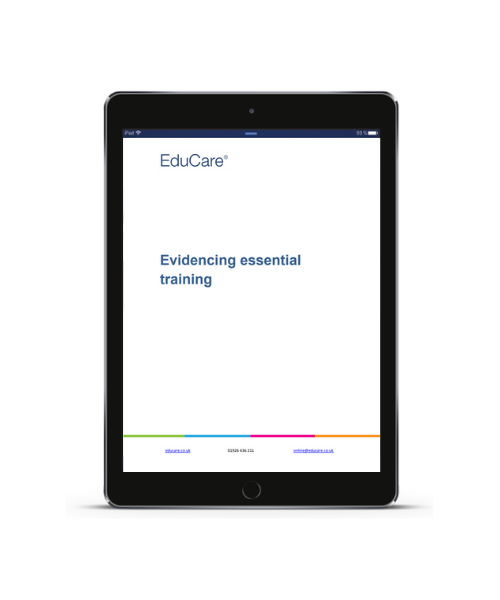_960.jpg)
How to evidence safeguarding training
When it comes to inspections, being able to demonstrate that staff have accessed high-quality training that meets mandatory and recommended training can be as important as the training itself.
Safeguarding training: What are inspectors looking for?
The Ofsted inspection handbook specifies that an outstanding grade is given where:
With regards to Prevent duty training, the handbook recommends that inspectors look for evidence of “High-quality training [that] develops staff’s vigilance, confidence and competency to challenge pupils’ views and encourage debate.”
Comments in CQC inspections for outstanding providers mention training records. For example:
“Staff told us they had received safeguarding training and that their knowledge of the safeguarding procedures was refreshed through completing annual update training. The staff training records also confirmed this took place.”
But inadequate providers were poorly marked:
“The registered manager told us they did not have systems in place to ensure that staff new to care completed the Care Certificate during their induction period.”
Family members – your harshest critic
For many organisations that do not have a mandatory inspection framework such as sports clubs and martial arts providers, satisfying family members that you offer a safe service is vital.
Under the proposed new voluntary code for out-of-school settings, questions that parents should ask have been specified including ‘what training have staff had?'
The notes state:
"All staff should have good working knowledge of and be appropriately trained in health and safety and child protection as a minimum. You may also wish to ask if providers have had equalities training and mental health. OOSS providers should be able to detail the training that has been undertaken by staff."
There is a more in-depth question:
"Who is your designated safeguarding lead (DSL) and what training have they had? How recent was this training?"
In the parent’s
“The provider should be able to name a person. A DSL should have as a minimum training on bullying, physical abuse, sexual harassment and sexual violence, sexting, hazing, online safety, and substance abuse. You may also wish to ask if they have had training on extremism and radicalisation. Training should have been provided within the last year."
Download our FREE resource 'Evidencing Essential Training'
3 key reports you can access through EduCare’s complete e-learning service
EduCare offers complete peace of mind.
EduCare’s comprehensive safeguarding and duty of care e-learning service
The courses are combined with a robust reporting suite to evidence that learning has taken place.
The online questionnaires that accompany each EduCare course come with a pass rate of 70%. This means that when a learner has completed a course, they have demonstrated an understanding of the subject matter. They can then download a personalised certificate for their own records and copies can be collected for central staff records.
For any HR manager, DSL, business manager or administrator who has to monitor staff training, assess workbooks or document attendance at training days, our simple to use reporting system provides quick and easy access to a range of essential reports – read our handy guide to find out more.
To request a demonstration, get in touch today.
Related items
Child Protection in Education
Child Protection in Education, endorsed by Kidscape and Family Lives is designed for those who work with children and young people in an education setting.
Read more3 ways EduCare can help you reduce costs
As budgets continue to be reduced across all schools and educational settings, here are three ways you can save money by using EduCare’s online learning service – EduCare for Education.
Read moreEvidencing Essential Training
When it comes to inspections, being able to demonstrate that staff have accessed high quality training that meets mandatory and recommended standards can be as important as the training itself. This guide will tell you more about the reporting included in our online learning service and which reports you may need.
Read more


